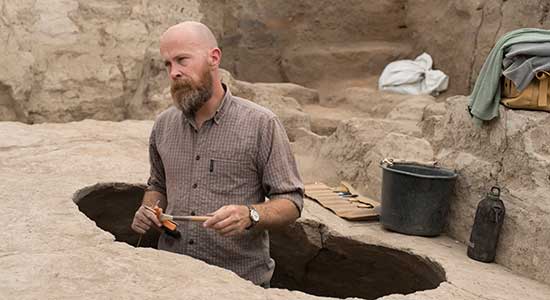Paper on early agriculture’s impact on human lifestyle awarded prestigious prize
Together with an international team of researchers, University of Copenhagen archaeologist Scott Haddow receives this year’s PNAS Cozzarelli Prize for co-authoring the best paper in the field of Social and Behavioral Science. The researchers were able to document that the transition to farming in Southwest Asia 11,000 years ago led to increased labour demands, risk of violence, and exposure to disease.

The journal PNAS (Proceedings of the National Academy of Sciences of the United States of America) awards the annual Cozzarelli Prize to the research teams whose articles have made outstanding contributions to their fields. Chosen from more than 3,300 papers that appeared in the journal in 2019, this year's winners represent exceptional scientific achievement, originality, and innovation in their fields.
Within the field of Social and Behavioral Science, the paper Bioarchaeology of Neolithic Çatalhöyük reveals fundamental transitions in health, mobility, and lifestyle in early farmers, which University of Copenhagen bioarchaeologist and Marie Curie Fellow Scott Haddow made significant contributions to, stood out as its authors were able to document the impact of early agriculture on human lifestyle.
To determine the impact of the transition on human lifestyle, health, and culture, the researchers conducted a bioarchaeological investigation at Çatalhöyük (7100–5950 cal BCE), a large Neolithic site in south-central Turkey that was continuously inhabited for 1,150 years. Building on earlier investigations, the authors analyzed the influence of the environment, diet, and living circumstances on human health and well-being at this early farming settlement.
The authors found that the transition to farming led to higher birth rates, which in turn led to crowded living conditions. Such conditions contributed to increased labour demands, risk of interpersonal violence, and exposure to disease, presaging similar changes in living conditions in settlements elsewhere. The study provides rich insights into human lifestyle changes wrought by early agriculture, the PNAS prize committee said.
Read more about the 2019 Cozzarelli Prizes
The authors and the article
Larsen, C.S., C.J. Knüsel, S.D. Haddow, M.A. Pilloud, M. Milella, J.W. Sadvari, J. Pearson, C.B. Ruff, E.M. Ga¬rofalo, E. Bocaege, B.J. Betz, I. Dori, and B. Glencross 2019. Bioarchaeology of Neolithic Çatalhöyük reveals fundamental transitions in health, mobility, and lifestyle in early farmers. Proceedings of the National Academy of Science 116(26): 12615–23.
Contact
Dr. Scott D. Haddow
Marie Skłodowska-Curie Research Fellow
Department of Cross-Cultural and Regional Studies
University of Copenhagen
Phone: +45 93 51 60 43
E-mail: scott.haddow@hum.ku.dk
Topics
Related News
Contact
Dr. Scott D. Haddow
Marie Skłodowska-Curie Research Fellow
Department of Cross-Cultural and Regional Studies
University of Copenhagen
Phone: +45 93 51 60 43
E-mail: scott.haddow@hum.ku.dk
Press officer Carsten Munk Hansen
Faculty of Humanities
Phone: +45 28 75 80 23
Mail: carstenhansen@hum.ku.dk
